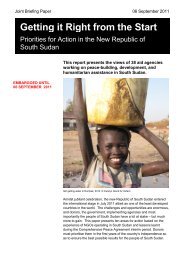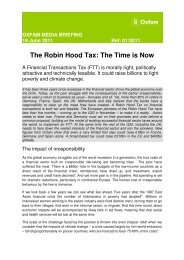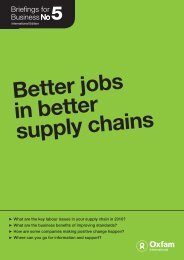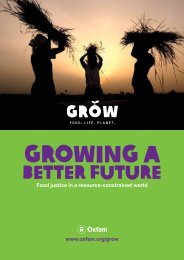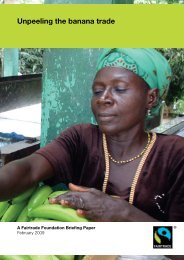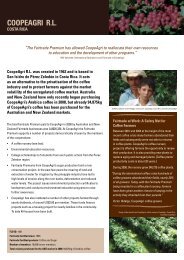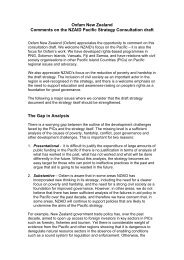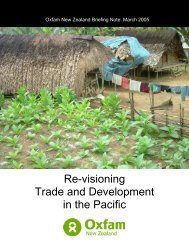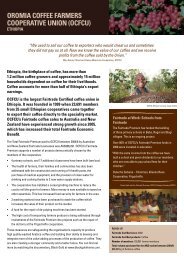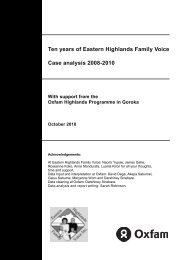Better returns for business.pdf - Oxfam New Zealand
Better returns for business.pdf - Oxfam New Zealand
Better returns for business.pdf - Oxfam New Zealand
- No tags were found...
Create successful ePaper yourself
Turn your PDF publications into a flip-book with our unique Google optimized e-Paper software.
SEVENTEENRole 4: Influencing public policyMany of the most significant poverty reductionand development challenges result fromweaknesses in public policy frameworks. Whileinvestor engagement can do much to encouragecompanies to take a more proactive approachto these issues, the reality is that effective actionis in many cases constrained by limitations inpublic policy. Investors have recognized thisproblem and a number have sought to work withpolicy makers to address these gaps. Two goodexamples are investors’ support of the ExtractiveIndustries Transparency Initiative (EITI) 32 and thepublic policy work of the Institutional InvestorsGroup on Climate Change (IIGCC). 33EITI is a multi-stakeholder initiative involvingoil and mining companies, governments, civilsociety organisations and institutional investors.It seeks to promote fiscal transparency and goodpublic governance in countries with a historyof misusing extractive revenues. It does thisby enlisting both the extractive companies thatoperate there to declare their tax, bonus androyalty payments, and the recipient governmentsto declare what payments they receive. Bymid-2009, 76 investors with some $13 trillion ofassets under management had explicitly backedthe EITI by signing an ‘investor statement’.MANY OF THE MOST SIGNIFICANTPOVERTY REDUCTION ANDDEVELOPMENT CHALLENGES RESULTFROM WEAKNESSES IN PUBLICPOLICY FRAMEWORKS.This investor support is widely recognizedas having played an important role in gettingcompanies to sign up to the EITI and to reportin<strong>for</strong>mation in line with the requirements of EITI.The Institutional Investors Group on ClimateChange (IIGCC) is a <strong>for</strong>um where morethan 50 European pension funds and assetmanagers representing around €50 trillion actcollectively to use their ‘significant collectiveinfluence to engage in dialogues with policymakers, investors and companies to acceleratethe shift to a low carbon economy.’ 34 Amongother activities, the IIGCC has sought to makea constructive contribution to internationalclimate change negotiation processes, calling<strong>for</strong> a strong global climate change treaty withambitious emission reduction targets. 35These kinds of voluntary initiatives can havesignificant benefits both by encouraging positiveaction and by helping to establish the need<strong>for</strong> effective regulation and en<strong>for</strong>cement bygovernments of coherent public policies thatprotect human rights and promote povertyreduction. In <strong>Oxfam</strong>’s view, responsibleinvestors have a clear interest in supportingstate regulation on these issues as it createsa level playing field <strong>for</strong> all companies andestablishes clear company per<strong>for</strong>mancestandards while encouraging good practice andinnovation.3.2 Responsible investment entering themainstream of the investment industryThe argument that investors have social andenvironmental responsibilities is increasinglyaccepted in the investment industry. This ismost clearly seen by the number of signatoriesto the UN-backed Principles <strong>for</strong> ResponsibleInvestment (PRI). As of the end of October2010, 827 investors, with the responsibility<strong>for</strong> more than $25 trillion of assets, andrepresenting 15 per cent of total global markets,had become signatories to the PRI. 36



